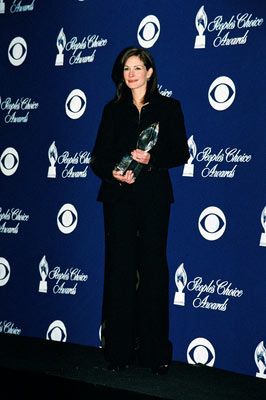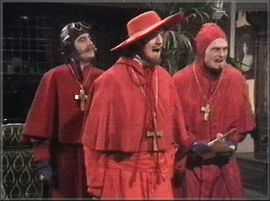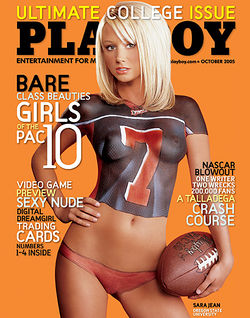Fahrenheit 56K
“"Fahrenheit 56K"? Ah, yes! That such a good American movie by Steven Spielberg.”
– Esperanza Aguirre on Fahrenheit 56K, passing three villages
“Yes, boss, aaaah... ahhhh, the Party... is very bad... ahhhh... the freedom of speech is... very good... ahhhh...”
– Julia Roberts on the bed fucking with her boss the Teacher and saying the right phrases for him to reach orgasm.
“The Party is very bad. Freedom of speech is very good. (Repeated 2389 times)”
– Somebody on the argument of the book Fahrenheit 56K.
“I want to be caliph instead of the caliph!”
– The Leader Iznogoud on his machinations.
“Books at least have an advantage. They are fuel. They burn.”
– The Inquisitor on burning books while trying to locate the Heretic.
“It is unfortunate! There are people who do not believe us even the few times we tell the truth!”
– The Leader Iznogoud on chat with the Inquisitor.
“There are such stupid things that nobody would say for free.”
– The Inquisitor on chat with the Leader Iznogoud.
Fahrenheit 56K is dystopical theatrical play written by Spanish Fernando de Querol Alcaraz. Their main subjects are the censorship, the freedom of speech and Internet. It deals with a corrupt dictatorial society dominated by "The Party", where it persecutes the dissidents, it commits many frauds, mainly in Spanish Marbella, lies continuously, damages Uncyclopedia and it imposes its ideology by the force. Some dissidents set out their critics through Internet but without enjoying broadband. In the work they appear a series of institutions and personages. It consists of a series of dialogues, many of them through chat. In the work they appear the majority of the typical topics of dystopias and other fiction works.
Origin[edit | edit source]
The author was visiting web page of Playboy, thinking what excuses to put if his wife pillaged to him, when the eMule downloaded inadvertently the Magic Google Copy&Paste DeLuxe. He proved the program and this one realise manifold copy&paste of several web pages about the freedom of speech, repeating the same things many times, until the iteration curl was stopped. And thus it was a series of dialogues in several pages. That if not for the program, it would have been more pages still. Soon, some things from novel 1984 was added (as already it is tradition in dystopias), several tons of cliches and it was published in the form of book, suitable to put it to balance the lame tables.
The, oh! so good, very good heroes[edit | edit source]
The Teacher[edit | edit source]
The Teacher is a very good, so good intellectual, that is in discord with the Party, is in favor of the democracy and the freedom of speech, has written a pile of books on a pile of subjects although in fact he does resorting to another persons and has time for a pile of activities: to organize a campaign of civil disobedience against the Party without going to the Gulag, to chat with the Messenger with other people, to loosen interminable speech with other people on the freedom of speech, to give paternalistic advice to a ex-Muslim woman advising to her that becomes atheist, to read to his secretary a piece of the novel 1984 of Orwell for increasing her culture and to seem a intellectual, to fuck with his secretary, to write many books, etc. However, he does not have time for exerting his profession of teacher. He never appears giving classes to his students.
He is preparing a book that agrees, except in secondary details, with the version of the Party and that differs with The Heretic. Everything within surroundings of cordiality and respect to the opposite opinions, since for The Teacher is good, oh, so good, yes, very good hero.
Julia Roberts[edit | edit source]
Julia Roberts is the secretary of the Teacher. Her work is rested enough. Her main occupation is to talk with her boss the Teacher while he touches her ass on the bad that the Party is and the good thing that the tolerance and the freedom of speech are.
This work leaves long free time to her and she had time to take part like protagonist in several films such as Pretty Woman, Steel Magnolias, Sleeping with the Enemy, The Pelican Brief, My Best Friend's Wedding, and many other films.
Soon it is the question: does she fuck with her boss? The work does not speak about this subject. But she does fuck with her boss. But this happens with discretion. She has to say: “The Party is very bad and the freedom of speech is very good” for her boss geting aroused.
The Heretic[edit | edit source]
The Heretic is a dissident who is not in agreement with the Party in a subject. He dedicates to writting books against the version of the Party. He sells his books in a local. The Party wants to locate and to give him away a free stay in a hotel named prison.
The Heretic also uses from time to time the Messenger and, as all the good very good heroes of this work, are in favor of the democracy and the freedom of speech.
The bad, oh so bad, villains[edit | edit source]
The Party[edit | edit source]
The State is dominated by the Party, dictatorial and corrupt. It pays dissidents a free stay in a hotel named prison. Like Wikipedia does. It tries to arrrest the Heretic but it is not able to locate him. In addition, the Party lies continuously and is rewriting History, especially its own History. More or less: “Wanted citizen: Before we have said this. Then now it is this other. Eat and be quiet”.
The Party commits many frauds: it acquires commissions by land requalification, take money of the public coffers to an account of the Leader in Switzerland, constructing buildings without license, etc. They circulate many rumors on frauds but the Party tries to discredit them by means of a continuous propaganda.
In addition, different managers of the Party distrust of other ones and stab in the back mutually. There are fights and intrigues within the same Party. The Party tries that the citizens believe all its ideology, putting under its dogmas their understanding and their will. Same like the Catholic Church does.
Soon there is in addition a series to flattering organizations who support to the Party and they dedicate to discreditting dissidents.
The Leader Iznogoud[edit | edit source]
At the time at which the action of the work is developed, the Leader, the Supreme Head of the Party, the Big Boss, is Iznogoud. This one, like his predecessors, is corrupt and takes money of the reserved funds and sends to an account in Switzerland. In addition he allows the construction of buildings without license. In addition, he indicates his subordinates so they capture the Heretic. And he undergoes a frustration and an enormous anger when the citizens do not believe all the lies that the Party says. He is gotten depressed and his psychologist has put under a therapy to surpass his traumas.
Previously there was several intrigues and fights. Iznogoud was not still the Leader. Then Iznogud thought continuously: “I want to be Caliph instead of the Caliph. I want to be the Leader instead of the present Leader, who then will be the previous Leader. And when he is the previous Leader no longer will be the present Leader, that I will be.” It almost was like tongue twister.
Then, after all those fights he gets the victory and he becomes the Leader instead of the Leader. Iznogud become present Leader and the previous Leader was imprisoned by his frauds while Iznogoud committed similar frauds.
The previous Leader[edit | edit source]
The previous Leader was Jesus Gil and Gil. He was corrupt, he acquired commissions and he allowed constructions without especially respecting the city-planning norms. He had rivalry and conflicts with Iznogoud and, as a result of a series of machinations, he was overthrown and he was imprisoned through traffic of influences, money laundering and several frauds more.
The Inquisitor[edit | edit source]
The Inquisitor is a servant of the Party that dedicates to persecuting the Heretic and to speaking with the Teacher of the bad thing that the democracy and the freedom of speech are. Also he gives speeches speaking of the bad thing that the democracy is and that the dissidents are bad, they undergo schizophrenia and that it is better than the citizens believe everything what the Party says. He either does not like that thing of a change of government by elections (as it happens in the democracies). He likes plus a change of government Rambo style, with combats like in a film of Hollywood.
However, he is an intolerant fanatic but in addition he is inept and a little goofy. In all the work he is not able to locate the local where the Heretic sells his books until the end. Not even then he is able to arrest the Heretic. When the Heretic puts his books in electronic format in Internet, then (and only then) found out that the prohibited books that wrote the Heretic could spread by Internet. Then he takes a big anger.
Other personages[edit | edit source]
Sara, a ex--Muslim woman.
Pablo, follower of the Heretic.
Daniel, who is bad, supports to the Party and allows the Teacher to be brilliant setting out his arguments.
Soon a series of personages who appear in the nightmare of the Teacher, burning books.
Argument[edit | edit source]
More or less, the work is a compilation of typical cliches of dystopias and fiction works. It has some elements of novel 1984, especially the falsification of History. It consists of a series of interminable dialogues about the Party and the freedom of speech.
The majority of the scenes usually responds to one of these classes: two good personages speaking among themselves, a good one speaking with a bad one, a bad one speaking with another bad one.
Two good personages speaking among themselves[edit | edit source]
Several of the scenes are dialogues of one good personage to other good one (either in person or by means of chat). For example, The Teacher with Julia Roberts or the Teacher with the Heretic. The dialogue is more or less like that:
The Teacher—The Party is very bad. The democracy and the freedom of speech are very good.
Julia Roberts—Quiet so, boss. The Party is very bad. The democracy is very good. The freedom of speech is very good.
This repeated many times.
A good personage speaking with a bad one[edit | edit source]
Other scenes are dialogues of a good personagee speaking with a bad one. For example, the Teacher speaking with the Inquisitor or the Teacher speaking with Daniel. The dialogue is more or less like this:
Inquisidor—Freedom of speech is very bad. The dissidents only deserve the prison.
Teacher—I do not agree. The freedom of speech is very good. Dissidents should have freedom of speech.
This repeated equally many times.
Two bad ones speaking among themselves[edit | edit source]
Other scenes are of two bad personages speaking among themselves. For example, the Leader Iznogoud with the Inquisidor. The dialogue is more or less like this:
Leader—Freedom of speech is very bad. I hope the Heretic to be arrested soon.
Inquisidor—At your command. The freedom of speech is very bad. The dissidents are very bad and are all crazy people. We will capture the Heretic soon.
This equally repeated many times.
Nightmare of the Teacher[edit | edit source]
The dialogues are so monotonous that the same Teacher fall asleep by boredom and, while he is slept, has a nightmare where they appear very bad and intolerant persons burning books (a little monothematic the Teacher).
Happy end[edit | edit source]
In the end, the Inquisitor is able to locate the local where the Heretic sold his books (slowly but surely). He orders to burn all those books. Then the Heretic decides to put his books in electronic format in Internet.
The Inquisitor realizes then that the prohibited books that wrote the Heretic could spread by Internet. A little goofy this man: could not he have thought about it earlier? Then, in a tremendous anger, he dedicates to burning books and modems! Soon he loosen a monologue saying that the censorship is ugly and what there is to do is to resort to arguments. That is, another one of the topics of fiction works: topic of the “bad one that becomes good”.
Finally the Teacher and the Heretic speak by chat and each says that he will like much to read books of each other. Everything in a cordiality and gentility atmosphere, like English gentlemans. “I present my respect to you.”, “It will be a pleasure to read your book.” “Thanks, you are very amiable.” “You are welcome.” “I will be enchanted to read it.”
The dictatorship[edit | edit source]
The society that appears is a dictatorship, but "light" and quite rather inoperative. The Teacher differs of the Party in some subjects and, even so, the Party lets make instead of send him to the Gulag. He contradicts to the Inquisitor in the dialogues and this one is limited to show his discord, without ordering his arrrest. The Teacher, in addition, organized a campaign of civil disobedience against the Party. Some dissidents set out their critics by Internet without the Party avoiding it. The Party is not able to obtain that their frauds remain privily.
The only person that the Party want to put in the jail is the Heretic. Even so, it is not able to arrrest him even in the end. Only in the end it is able to locate the local where he sold his books without paying taxes. In the end, the Inquisitor becomes good and recognizes that there is to resort to arguments and that the freedom of speech is not so bad either. The dictatorship cannot either prevent that the Heretic spreads his books by Internet.
Alternative Versions[edit | edit source]
Fahrenheit 56K allows a series of possible alternative versions, where it is possible to specify with more details which are the diverse personages and institutions in that work. We will see these alternative versions.
Pornographic Version (soft)[edit | edit source]
The Party is dominated by a group of fundamentalist Christians. The Party has forbidden the pornographic magazines because “they suppose an attack against the Christian values of the modesty and the chastity”.
The Heretic is Hugh Hefner, that has a local where he sells copies of the magazine Playboy, that he himself publishes. This is forbidden, of course. The Inquisitor wants to locate this local and arrest him.
Finally, the Inquisitor is able to locate the local and commands to burn all the copies of Playboy excepting those ones that he keeps for his personal use. Then, the Heretic Hugh Hefner decides to put the photos in a web. Then, the Teacher says to him in chat: “I will be enchanted, but very enchanted, to visit your web page and to see the photos. What a wonderful web page you have!”[1].
Pornographic Version (soft) variant feminist[edit | edit source]
The Party is dominated by a radical feminist group. The Party has forbidden pornographic magazines because “they suppose a sexist use of the body of the woman”.
The Heretic is Hugh Hefner, that has a local where he sells copies of the magazine Playboy, that he himself publishes. This is forbidden, of course. The Inquisitor wants to locate this local adn arrest him.
Finally, the Inquisitor is able to locate the local and commands to burn all the copies of Playboy excepting those ones that he keeps for his personal use. Then, the Heretic Hugh Hefner decides to put the photos in a web. Then, the Teacher says to him in chat: “I will be enchanted, but very enchanted, to visit your web page and to see the photos. What a wonderful web page you have!”.
NOTE: If the Christian religion is a male-chauvinist religion, why Christians and feminists want to forbid the same things? There is something that does not fit.
Version in Playback[edit | edit source]
The Teacher leaves a connected MP3 apparatus to loudspeakers and leaves a sound file that repeats continuously: “The Party is very bad. The freedom of speech is very good.” time and time again. Soon he goes away with Julia Roberts to a Caribbean beach like holidays. There they spend the time in the beach bathing, having fun, practicing nautical sports and fucking every day.
Software Version[edit | edit source]
The Party is Microsoft. The present Leader is Bill Gates. The previous Leader whom there were fights with is Steve Jobs. The Party is despotic and wants to persecute all the forms of alternative software. The Inquisitor is one of the managers of Microsoft. The Teacher is a misleading poor man that still uses Windows and Microsoft Office.
The Heretic is Linus Torvalds, partisan of the free and creative software of Linux and OpenOffice. He spreads this software with license GNU GPL. In the final scene, the Teacher says to him: “It will be a pleasure to use this software.” Finally, the Teacher installs in his computer Linux and OpenOffice and he realizes how fine they works.
Wikipedia Version[edit | edit source]
Fahrenheit 56K narrates the conflicts between Wikipedia and Uncyclopedia. The Party is Wikipedia. The present Leader is Jimbo Wales. The Inquisitor is a librarian that is quite angry (that is, like all librarians). The Teacher is a Wikipedia writter that has been blocked of temporary form several times to fail to fulfill the WP:WHAT, concretely the WP:AB, the WP:ZD and the WP:UI.
The Heretic had been a Wikipedia writter that was blocked permanently to fail to fulfill the WP: ZZ. Then he discovers an encyclopedia in Internet that is marvellous, rigorous and of great intellectual content (yes, I talk about the Uncyclopedia) and he dedicates to writting many articles in it. The Inquisitor and the others librarians of the Wikipedia are angry by not being able to obtain an encyclopedia so marvellous as this one and want to avoid that the Heretic goes on writing in the Uncyclopedia.
In the final scene, the Teacher realizes how serious, rigorous and wonderful is the Uncyclopedia and he says to the Heretic: “It will be a pleasure to read your articles in Uncyclopedia. And I also want to participate.” And from then, the Teacher writes articles in Uncyclopedia. And the Inquisitor recognizes that Uncyclopedia is far better than Wikipedia.
Version SGAE[edit | edit source]
The Party is SGAE. The Leader is Sir Teddy Bautista. The Inquisitor is Pedro Farré. The Party tries to defeat the P2P and to impose the canon. The Heretic downloads music and films with the eMule.
In the final scene, the Teacher says to the Heretic: “It will be a pleasure to share my archives with you.” Then he forms the eMule and he obtains a pile of nice films. The Party continues scheming to secure more money (and also tries that Fahrenheit 56K, work that dedicates to ridiculing them, is forbidden).
Version hard dictatorship[edit | edit source]
In a hard dictatorship (instead of the light dictatorship that appears in the work) the Teacher gets a free train ticket to the Gulag as soon as he dares to talk back to the Inquisitor or to differ of the Party although even only in secondary details. The Heretic is denounced as soon as he takes his heretical books to the press and also obtains a free train ticket.
There in the Gulag, both can interchange all the courtesy phrases that they want while they die of cold in Siberia. Indeed, in this dictatorship Internet does not exist.
Advertising Version[edit | edit source]
In fact, Fahrenheit 56K has been financed by a well-known Internet provider and it is only concealed publicity. Which even can be deduced of the title of the work.
The Party dominates a society where the citizens only have Internet connection of 56K (that is, a very slow connection). The citizens are very displeasures with the slowness of the Internet connections. The Teacher also is displeased by slowness. The Inquisitor wants to avoid that the citizens go away to the competition, becoming a contract of high speed Internet.
In the final scene, the Heretic convinces the Teacher to make an ADSL contract by a ridiculous quota. The Teacher gets pleased with his new connection of high speed of many Megas.
That is, as I said before, it is clear that this work is only publicity.
Pastafarianist Version[edit | edit source]
The Party is one of so many false religions. The Inquisitor is that, an inquisitor. The Party and the Inquisitor want to avoid that people know the Pastafarianism (that is the only true religion). The Teacher is a man educated in a false religion that is full of doubts and he begins to think that the Pastafarianism is perhaps the only true religion.
The Heretic is an Uncyclopedia writter that adores the only true God: Flying Spaghetti Monster. In the final scene, the Teacher realizes that the Pastafarianism is the only true religion and he communicates to the Heretic his intention to be united and to practice the Pastafarianism and to eat vermicelli, noodles, spaghetti, pizza, etc. “There is no more God than the Flying Spaghetti Monster and Bobby Henderson is his Prophet.”, both say in the final scene.
Academic Version[edit | edit source]
The Teacher is that, a teacher in a school. Enough problems, that is to say, he has with their profession at school, the schoolboys, their little pay, etc. for moreover dedicating himself to writting books or to speaking continuously about the Party or freedom of speech.
Regarding Julia Roberts, the only times he sees her is when he sees some of her films in the cinema or in DVD.
Version Agatha Christie[edit | edit source]
The previous Leader has appeared murdered. The suspect ones are the Teacher, Julia Roberts and the Inquisitor. Hercule Poirot goes on stage. This one, using the Google and examining the computer registries of the all suspect ones, arrives at a few tracks. Finally, he interrogates by means of chat all the suspect ones.
Finally he discovers that the murderer has been the Leader Iznogoud. But as this one has the power, he expels Hercules Poirot from the country. It is the lamentable thing: that sometimes knowing who is the murderer serves for nothing.
Version Film noir[edit | edit source]
Julia Roberts has her heart divided between the love of the Teacher, her husband, and the Inquisitor, her lover. She organizes with her lover the murder of her husband for marrying with her lover and for gaining moreover the life insurance.
But the Heretic warns the Teacher, who must realise a frenetic running away. Finally, the detective Philip Marlowe can arrest the criminals before they get their criminal intentions.
Version Hollywood movie[edit | edit source]
The work will be still more stereotyped, if possible. The good very good ones will be still better. The bad very bad ones will be still worse. The previous Leader, instead going into prison, will have been evilly murdered by henchmen of Iznogoud. The bad ones are so bad that they even kill among them.
A lot of typical computer scenes of hackers will be put. For this, it will be necessary to resort to a scriptwriter who has no computer science idea, so that what it happens cannot moderately be likely. Those hackers will be able to infiltrate in computers that are turned off, will even enter virus that warns by means of big signboards that put clearly “Uploading virus”, will turn aside money from banks to others giving bills in Indian row through the cable of the telephone, in the passwords warns to them of what digits have right, and so on.
Also, like in all film of Hollywood, there will be a romance of Julia Roberts with the Teacher with including screw. If it is wanted to twist a little the things, this one may have a lover but soon he will return sorry to the love of Julia Roberts.
The happy end will be more better. Immediately there is a rebellion that prevails immediately, in the most improbable and unearthly conditions (that for something they have plug of the scriptwriter). The Inquisitor and the Leader Iznogoud dies, it is restored democracy, the Heretic is the new Leader and on the final scene the Teacher and Julia Roberts kiss themselves tenderly while it sounds the music of the end.
Version Windows 98[edit | edit source]
When the personages talk by chat, the computer hangs every five minutes and continuously blue screens appear. It is necessary to be reinitiating continuously and chats last much more time.
When the Heretic upload his books in Internet, he had to trying four or five times, because his computer hung continuously. He needed to reinitiate his computer at least four times to be able to upload all his books at Internet.
Version Google[edit | edit source]
The Party is Internet. The present Leader is Google, that controls all, handles all and knows all. As far as the Heretic,… in this world no longer heretics can exist. We are in its hands! Agh…
The Big Google is watching you[2]!
Notes[edit | edit source]
See also[edit | edit source]
External Links[edit | edit source]
- FAHRENHEIT 56K. Fernando de Querol Alcaraz. Editorial Bubok. It includes whole eBook (in spanish language) for downloading in PDF format
- Another link for downloading whole eBook (in spanish language) in PDF format
- FAHRENHEIT 56K - Fernando de Querol Alcaraz - Opinion. Leido
- Literatura Prospectiva. Mundo Espejo. Fahrenheit 56K, de Fernando de Querol Alcaraz
- Portal de Ciencia Ficción - Fahrenheit 56K - Fernando de Querol Alcaraz - Bubok, 2009 (teatro)
- Reseña: FAHRENHEIT 56K, de Fernando de Querol Alcaraz. - Planetas Prohibidos
- Fahrenheit 56K - Alt64-wiki
This page was originally sporked from Inciclopedia |







